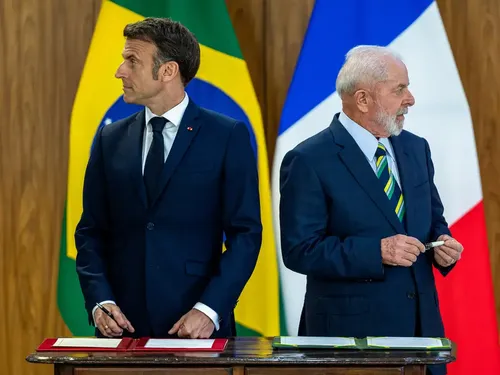
The agreement between Mercosur and the European Union was one of the themes that permeated the conversations between Brazilian president Luiz Inácio Lula da Silva and his French counterpart, Emmanuel Macron. The presidents, however, did not reach any understanding on the proposal defended by Brazil, which has the French president as its main critic in Europe.
During a visit to São Paulo (SP) this Wednesday (27), Macron classified the agreement as “terrible” and argued that it “needs to be renegotiated from scratch”. “Let’s put aside an agreement from 20 years ago and build a new, more responsible agreement, providing for issues such as climate and reciprocity.”
Political scientist and international analyst Ana Prestes assesses that “on Brazil’s part there is an interest in signing the agreement, there was disappointment among Brazilian diplomats in not having announced this agreement the previous year, when the country hosted Mercosur. But it is difficult, because the Macron government is guided by the internal dynamics of French producers and it is difficult for it to unlock this agenda.”
“Bolsonaro’s DNA”
Meeting in Brasília between the 17th and 19th of March, social movements from the countryside, waters and forests, articulated in Via Campesina Brasil, repudiated the agreement in a statement in which they asked Lula to “listen to the cry of the people of the countryside, waters and forests and put an end to ongoing negotiations and give space to the construction of a popular national development project for Brazil”.
“The agreement in question represents a setback for Brazil and the Mercosur countries in the scope of socioeconomic development, as well as a frontal attack on the sovereignty of our countries”, highlights the statement.
Popular movements highlight that the agreement was “rejected more than 20 years ago” and the current text, resumed in 2019, represents “the Bolsonarist DNA in its essence without any commitment to the development of our country.”
“The agreement assumes neocolonial characteristics in its conception and threatens, in its terms, our people and territories, threatens peasant agriculture, traditional communities and hands over our common goods to the interests of international capital, thus consolidating the agro-export character of our economy, which It is basically to continue exporting raw materials to meet the demands of European countries in exchange for industrialized products.”
Market deregulation, free trade agreements and, in particular, the negotiation of the free trade agreement between the European Union and Mercosur are the main causes of the serious crisis faced by European farmers in La Via Campesina’s assessment.
Editing: Rodrigo Durão Coelho
Source: www.brasildefato.com.br

